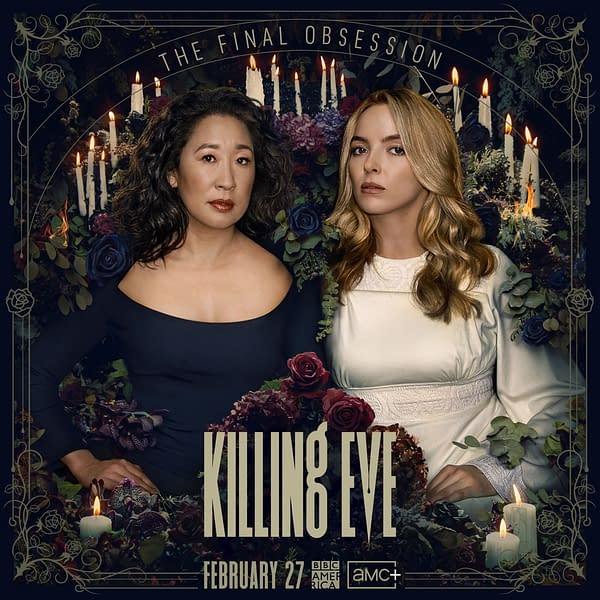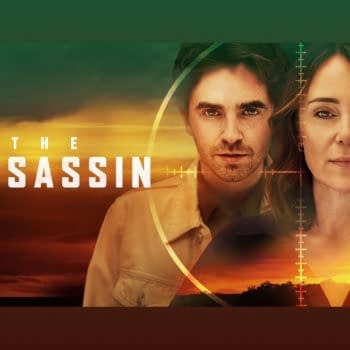Posted in: BBC, TV | Tagged: bbc america, Jodie Comer, Killing Eve, Luke Jennings, Phoebe Waller-Bridge, Sandra Oh, villanelle
Killing Eve: Villanelle's Real Killer? Miserable British Puritanism
Killing Eve, the cult series about a hitwoman and the woman who stalks her, may have had the worst ending of any TV series of the last 12 years. Nobody was happy with it except maybe the showrunner, but she might have just been putting up a brave front. The writers seemed to say they did the best they could. It was joyless and miserable, the type of terrible, pointless, and obvious ending that ruined everything that came before it. It was probably the most glaring failure to stick an ending of any show for years. It didn't so much end as just… stop, as if the writers just threw up their hands and wanted it over and done with. The ending may not just be a lack of ideas, but a result of the unique brand of British puritanism – the writers just had to punish the antiheroine because she was joyful.

Even Luke Jennings, the original creator of the Villanelle novels said, as politely as possible, that it sucked. "When Phoebe Waller-Bridge and I first discussed Villanelle's character five years ago," he wrote in the Guardian, "We agreed that she was defined by what Phoebe called her "glory": her subversiveness, her savage power, her insistence on lovely things. That's the Villanelle that I wrote, that Phoebe turned into a screen character, and that Jodie ran with so gloriously."
The first season of Killing Eve is still its best. It broke the mold for its gleeful subversiveness: it was about a hitwoman who enjoyed killing people without apology, and the repressed intelligence agent hunting her who develops a fascination for her that walked the line between envy and lust. The latter seemed to be mutual, but the women's mutual attraction wasn't necessarily sexual as emotional. Villanelle (Jodie Comer in her breakthrough career-making role) is a fantasy figure who has come to represent the kind of freedom that many women crave but is impossible in real life, a woman who has fun with her life. She killed without remorse and wore crazy, fabulous clothes. Eve, the government agent tracking her discovers Eve to be her shadow self, the opposite of her repressed, rule-bound life. It also gave Sandra Oh a breakthrough role that allowed her full range of emotional complexity and jittery comedy, launching her career into a new trajectory. Showrunner Phoebe Waller-Bridge is a British writer who finds joy and comedy in the messiest situations. This is what made her show Fleabag a career-defining breakthrough – her heroine found joy in sex and living no matter how dysfunctional, messy, and hurtful relationships got. Fleabag did terrible things and took responsibility, but she was never miserable about it. Waller-Bridge's ability to find joy in her characters' lives is actually a rare turn from the puritanism of many British storytellers who feel the need to punish their characters, especially the women.
The problem with Killing Eve after the first season is that not only did the showrunners who succeeded Waller-Bridge not know what the hell to do with Villanelle, but they also had that British puritanical streak that everyone has to suffer and be punished for enjoying life. The show was about punishing Villanelle starting from Season 2, and it got worse with each new season, to the point where she had a nervous breakdown, tried to change and find religion, until they finally just had her shot in the finale, the most boring way to end her story and the show. Villanelle in season one enjoyed her job and her life. Waller-Bridge established that, and each showrunner for each season after that just kept wanting to punish her for that, and Eve for envying her joy and unapologetic nature.
And the writers are definitely not LGBTQ because they buried the gay in the finale in the cruelest, most abrupt and unthinking way. The show takes a heteronormative stance in punishing Eve and Villanelle for being in love. It's the most ham-fisted and wrongheaded ending that sets back both lesbian representation and feminism. Did the writers intend this or think it through by ending Killing Eve, a show that many lesbian fans loved, by punishing the main characters coming out as lesbians? That's how it ended up. The show became so puritanical that it couldn't even dare to take its escapism to the end by letting its heroines find a surprising escape; instead, crashing them back down to Earth with banal moralizing. Villanelle even stopped wearing bright, colourful, crazy dresses and settled into dreary clothing you'd seen on everybody at the local supermarket. Even the cinematography got grey and dreary, shot in the most dreary locations in England rather than the glamour of Paris or Italy.
Killing Eve is now streaming on BBC America in the US. If you haven't seen it, do yourself a favour and only watch the first season. Don't bother with the rest. Go back to that beginning where Villanelle represented both the joy of freedom and the terror of being untethered from conventional morality. The next seasons just needed to punish female anarchy. The original fun version of Villanelle is still alive and will come back in more novels by her original creator Luke Jennings.












